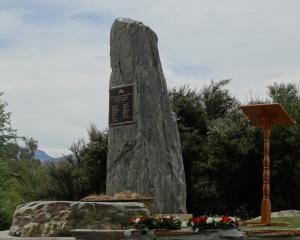Large numbers of young men have presented themselves from the towns and country districts, fired with an enthusiasm to serve their King and country.
Many of these had to return to their homes disappointed, owing to not being able to pass the medical test, which was conducted in thorough workmanlike manner.
After successfully undergoing the medical tests the recruits were enrolled and despatched to camps on the football ground and Show Ground, which have presented a scene of martial activity.
The infantry were under command of Lieutenant R. L. Duthie (Milton), assisted by Lieutenants J. T. Moroney (Milton) and J. A. Lyttle (Gore); and Sergeant-major Shortall, of the permanent staff, was associated as drill instructor.
The mounted men were under command of Lieutenants R. G. Mitchell and J. Paterson, with Sergeant-major Connolly as drill instructor.
Lieutenant W. L. Richards had charge of the commissariat.
The roll number in camp on Sunday afternoon was 112 infantry and 97 mounted men.
During their brief stay in camp the men were put through a course of training, and showed great aptitude and pleasure in their work.
Keen satisfaction was expressed by the volunteers when definite intimation was received of their departure for the main concentration camp at Tahuna Park.
Monday was a busy day completing final arrangements, but everything was in readiness early in the afternoon, and about 2.45 p.m. the men shouldered their greatcoats and rifles, and, headed by the 14th Regimental Band, marched to the Coronation Hall.
The business premises had been closed in honour of the departing volunteers, and a large crowd assembled to bid them a hearty farewell.
Brief, pithy addresses were delivered by the Mayor (Mr Charles King), Mr A. S. Malcolm, M. P., Lieutenant-colonel A. E. Stewart, Chaplain-captain Rev. J. C. Small, and Mr George M'Laren.
The proceedings lasted about 20 minutes, and again the column marched off to entrain at the railway station and await the arrival of the special troop train from Invercargill.
There were some touching, pathetic leave takings, but a spirit of cheeriness and optimism dominated the proceedings, and, as the special train, now conveying the combined South Otago and Southland forces, steamed out, they were accorded a hearty salvo of cheers by the assembled citizens, the crowd numbering several hundreds.
• Some people may have noticed the announcement that £1,865,000 approximately has been spent up to date on the trans-continental railway from Port Augusta to Kalgoorlie. When Australians realise what those figures mean they will have something to think about.
There were 1065 miles of railway to be built between Kalgoorlie and Port Augusta.
Up to the present 190 miles of rails have been laid; or, if the earth-works be taken, an additional 15 miles - 205 in all - have been completed.
The original estimate for the cost of the whole line was £4,000,000. But when all allowance is made for the stocks in hand, it is perfectly clear that the trans-continental railway is going to exceed by an enormous amount the estimate of the cost.
It is impossible to give definite figures, but the Commonwealth will probably be lucky if the line is finished for a penny under £7,000,000. - ODT, 19.8.1914
• COPIES OF PICTURE AVAILABLE FROM ODT FRONT OFFICE, LOWER STUART ST, OR WWW.OTAGOIMAGES.CO.NZ

